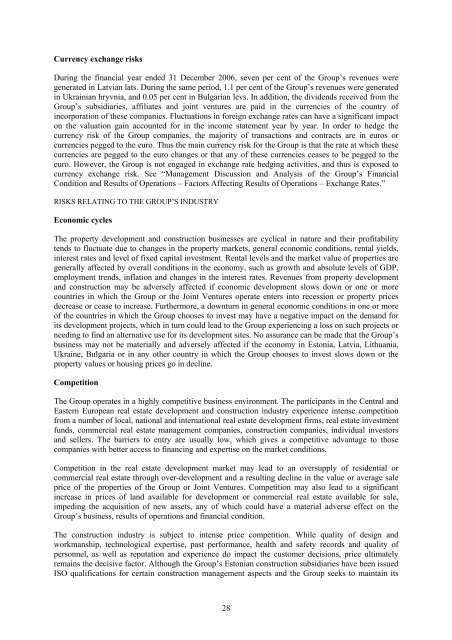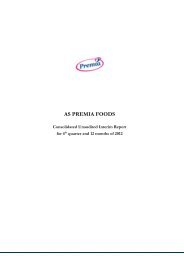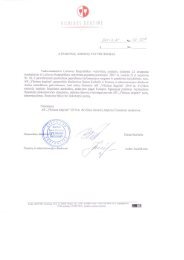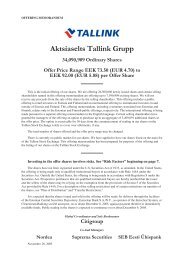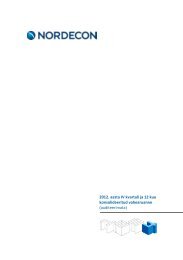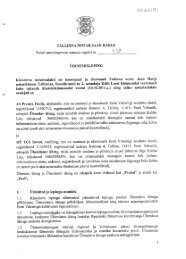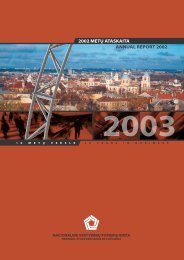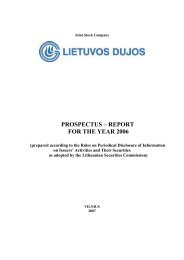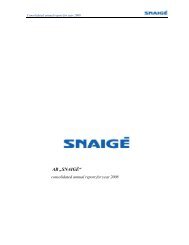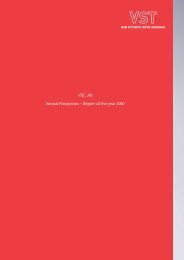ARCO VARA AS - NASDAQ OMX Baltic
ARCO VARA AS - NASDAQ OMX Baltic
ARCO VARA AS - NASDAQ OMX Baltic
Create successful ePaper yourself
Turn your PDF publications into a flip-book with our unique Google optimized e-Paper software.
Currency exchange risks<br />
During the financial year ended 31 December 2006, seven per cent of the Group’s revenues were<br />
generated in Latvian lats. During the same period, 1.1 per cent of the Group’s revenues were generated<br />
in Ukrainian hryvnia, and 0.05 per cent in Bulgarian levs. In addition, the dividends received from the<br />
Group’s subsidiaries, affiliates and joint ventures are paid in the currencies of the country of<br />
incorporation of these companies. Fluctuations in foreign exchange rates can have a significant impact<br />
on the valuation gain accounted for in the income statement year by year. In order to hedge the<br />
currency risk of the Group companies, the majority of transactions and contracts are in euros or<br />
currencies pegged to the euro. Thus the main currency risk for the Group is that the rate at which these<br />
currencies are pegged to the euro changes or that any of these currencies ceases to be pegged to the<br />
euro. However, the Group is not engaged in exchange rate hedging activities, and thus is exposed to<br />
currency exchange risk. See “Management Discussion and Analysis of the Group’s Financial<br />
Condition and Results of Operations – Factors Affecting Results of Operations – Exchange Rates.”<br />
RISKS RELATING TO THE GROUP’S INDUSTRY<br />
Economic cycles<br />
The property development and construction businesses are cyclical in nature and their profitability<br />
tends to fluctuate due to changes in the property markets, general economic conditions, rental yields,<br />
interest rates and level of fixed capital investment. Rental levels and the market value of properties are<br />
generally affected by overall conditions in the economy, such as growth and absolute levels of GDP,<br />
employment trends, inflation and changes in the interest rates. Revenues from property development<br />
and construction may be adversely affected if economic development slows down or one or more<br />
countries in which the Group or the Joint Ventures operate enters into recession or property prices<br />
decrease or cease to increase. Furthermore, a downturn in general economic conditions in one or more<br />
of the countries in which the Group chooses to invest may have a negative impact on the demand for<br />
its development projects, which in turn could lead to the Group experiencing a loss on such projects or<br />
needing to find an alternative use for its development sites. No assurance can be made that the Group’s<br />
business may not be materially and adversely affected if the economy in Estonia, Latvia, Lithuania,<br />
Ukraine, Bulgaria or in any other country in which the Group chooses to invest slows down or the<br />
property values or housing prices go in decline.<br />
Competition<br />
The Group operates in a highly competitive business environment. The participants in the Central and<br />
Eastern European real estate development and construction industry experience intense competition<br />
from a number of local, national and international real estate development firms, real estate investment<br />
funds, commercial real estate management companies, construction companies, individual investors<br />
and sellers. The barriers to entry are usually low, which gives a competitive advantage to those<br />
companies with better access to financing and expertise on the market conditions.<br />
Competition in the real estate development market may lead to an oversupply of residential or<br />
commercial real estate through over-development and a resulting decline in the value or average sale<br />
price of the properties of the Group or Joint Ventures. Competition may also lead to a significant<br />
increase in prices of land available for development or commercial real estate available for sale,<br />
impeding the acquisition of new assets, any of which could have a material adverse effect on the<br />
Group’s business, results of operations and financial condition.<br />
The construction industry is subject to intense price competition. While quality of design and<br />
workmanship, technological expertise, past performance, health and safety records and quality of<br />
personnel, as well as reputation and experience do impact the customer decisions, price ultimately<br />
remains the decisive factor. Although the Group’s Estonian construction subsidiaries have been issued<br />
ISO qualifications for certain construction management aspects and the Group seeks to maintain its<br />
28


